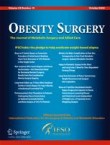
Abstract
Background
Bariatric surgery is a durable and effective way for the management of obesity and resolution of related comorbidities. The aim of this study is to evaluate the outcome of laparoscopic sleeve gastrectomy (LSG) and one-anastomosis gastric bypass (OAGB) over long term in a South Asian population.
Materials and Methods
This is a prospective randomised trial comparing the outcome of 100 and 101 LSG and OAGB patients respectively after 5-year follow-up. This study is in continuity with previous published papers with 1- and 3-year follow-up. 71 LSG and 73 OAGB patients followed at 5 years. The results of these patients were analysed and compared in terms of %EWL, comorbidity resolution and quality of life (QoL) at 5 years. Bariatric analysis reporting and outcome system (BAROS) was used to assess the outcome of patients.
Results
At 5-year follow-up, both LSG and OAGB patients performed well and patients had significant improvement in BMI (kg/m2). The mean preoperative BMI of LSG and OAGB patients was 44.89 ± 7.94 and 45.32 ± 8.24, and their mean BMI at 5 years was 33.41 ± 6.02, 30.80 ± 3.40 respectively. At 5 years, %EWL was 55.95 ± 27.01 and 65.28 ± 13.98 for LSG and OAGB patients respectively. The QoL score of LSG and OAGB patients was 1.86 ± 0.56 and 2.35 ± 0.41 while comorbidity score was 1.84 ± 0.68 and 2.24 ± 0.62 respectively at 5 years.
Conclusions
Both LSG and OAGB are effective bariatric procedures over long term with respect to weight loss, comorbidity resolution and improvement in QoL. OAGB is significantly better than LSG in all the three parameters at 5 years.




Δεν υπάρχουν σχόλια:
Δημοσίευση σχολίου